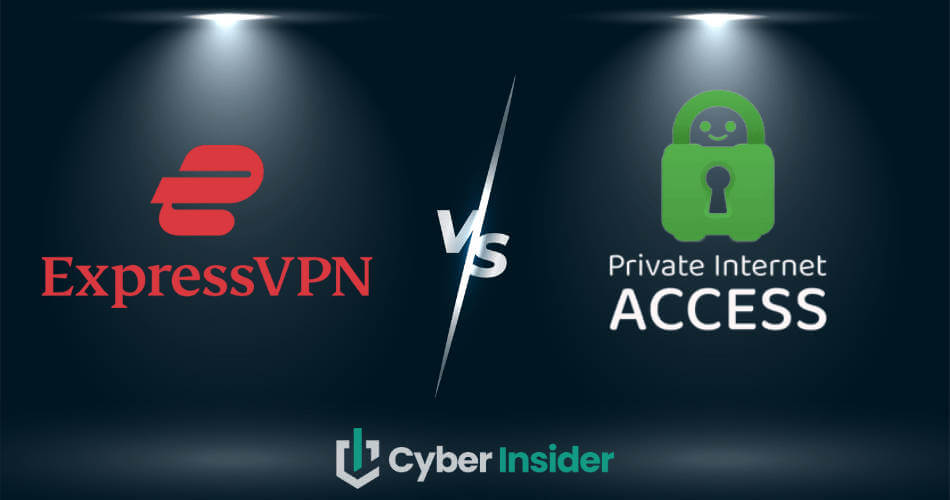
Nearly everyone has heard of ExpressVPN and Private Internet Access (PIA). Both of these VPNs have been around for years and each one has millions of users. However, in running dozens of tests for this ExpressVPN vs PIA comparison report, we discovered there was a clear winner in nearly every category.
The competition between ExpressVPN and PIA may look close on the surface, but our tests revealed a much wider gap once we dug deeper. The results raise an important question: which service truly delivers the best value for your money?
This table highlights the key facts from each VPN:
| ExpressVPN | PIA | |
| Website | ExpressVPN.com | PrivateInternetAccess.com |
| Location | British Virgin Islands | United States |
| Servers | 3,000+ | 35,000+ |
| Countries | 94 | 91 |
| Logs | No logs (audited) | No logs (audited) |
| Torrenting | All servers | All servers |
| Support | Knowledge Base; 24/7 live chat | Knowledge Base; 24/7 live chat |
| Apps for | Windows, macOS, Linux, Android, iOS | Windows, macOS, Linux, Android, iOS |
| Price | $3.49 (with coupon) | $2.03 |
| Coupon | 73% Off + 4 Months Free > | N/A |
Here are the different categories we'll examine in this comparison of PIA and ExpressVPN:
- Company and Jurisdiction (background check)
- Speeds
- Reliability
- Price
- Features
- Support
- Netflix and Streaming
- Security and Encryption
Let's get started.
Company background and jurisdiction
With all of our VPN reviews and VPN comparisons, we first conduct an extensive background check of each service. This includes looking at the VPN's history, policies, and where it is legally based (jurisdiction).
Private Internet Access background and jurisdiction
PIA was once one of the leading VPN services, perhaps peaking in 2017. But a lot has changed since then. Based on my own tests and observations, PIA has been going downhill for the past few years. Many people have been canceling their subscriptions and venting concerns in various forums online.
In 2019, PIA announced that it was selling out to Kape Technologies. Kape is a major player in the VPN industry, and it also owns ExpressVPN and CyberGhost.
To make matters more interesting, Kape purchased VPN review websites and also ranks its products in the top spots. (You can learn more about the history of Kape and Crossrider here.)
PIA has also suffered a few scandals regarding people who were hired to work with the company. This includes Mark Karpeles, who was convicted of crimes in Japan and was also involved with the Mt. Gox bitcoin fiasco.
PIA Jurisdiction
PIA is based in the United States. The US is a Five Eyes country, and that is not good for privacy. There have also been numerous cases of US tech companies being forced to log and hand over customer data, while also being prohibited from disclosure due to gag orders. See, for example, Lavabit and also Riseup, an email and VPN service. There was also a case where IPVanish was forced to log user data for the FBI, all while claiming to be a “zero logs” VPN.
ExpressVPN background and jurisdiction
From everything I could find in my research, ExpressVPN has a clean background, and we have been following this VPN for years. It has a long track record and continues to grow and gain users worldwide. Unlike IPVanish, ExpressVPN has not had any scandals or issues affecting user privacy. Instead, it has undergone numerous audits to further bolster trust and ensure the highest levels of security.
The big change, however, is that Kape bought ExpressVPN, with the plans being announced in September 2021.
ExpressVPN Jurisdiction
ExpressVPN is based in the British Virgin Islands. The BVI is a great offshore jurisdiction. It is not a member of any surveillance alliances and is also politically and legally independent from external influence. We see other VPNs that have been incorporated in the BVI, as we discuss in the ExpressVPN vs Surfshark comparison.
Company and jurisdiction winner: ExpressVPN
ExpressVPN vs Private Internet Access speed tests
Speed is an important consideration with VPNs, especially since many online activities require lots of bandwidth. We ran all of the PIA vs ExpressVPN speed tests on a 500 Mbps connection using the official VPN desktop apps. With our protocol selection, we used the fastest VPN protocol that each VPN offers:
- Private Internet Access supports the WireGuard protocol, which is the fastest VPN protocol we have tested.
- ExpressVPN supports the Lightway protocol, which is very similar to WireGuard, with similar performance (in most cases).
Using these two respective VPN protocols, we ran speed tests from our US lab. Here are the results:
VPN servers in the United States
First up was an ExpressVPN server in Seattle with download speeds of about 196 Mbps:

This is pretty good at over 100 Mbps, but it's certainly not the fastest VPN we have tested. Let's see how Private Internet Access compares.
Here was the PIA server in Seattle with download speeds of 41 Mbps:

As you can see, Private Internet Access is really slow in this test. For this server location, we can see that ExpressVPN is over 150 Mbps faster than PIA.
Next up were servers in Los Angeles.
Here was the ExpressVPN server in Los Angeles, giving us download speeds of around 231 Mbps:

At over 200 Mbps, this is a pretty good speed test result. Let's see if PIA can do any better.
Here was the PIA server in Los Angeles with speeds around 85 Mbps:

Once again, we see that ExpressVPN is much faster than Private Internet Access. The last server location we tested in the US was in New York.
Here was the ExpressVPN server in New York with speeds of 214 Mbps:

Another good speed test result from ExpressVPN. Let's see if PIA can get at least one win.
Here was the Private Internet Access server in New York with speeds of around 23 Mbps:

With the New York server location, ExpressVPN is faster than PIA by about 191 Mbps. We're seeing a pattern here. Perhaps servers in Europe are different?
VPN servers in the United Kingdom
Here was the ExpressVPN server in the UK with speeds of 235 Mbps:

So far, this is the fastest VPN speed test result we've gotten from ExpressVPN.
Here was the PIA server in the UK, giving us speeds of only 10 Mbps.

It goes without saying that this is really slow. PIA is not the best UK VPN if performance is a top priority. For our last server location, ExpressVPN was faster than PIA by about 225 Mbps — a huge margin.
These test results also line up with user feedback and comments about PIA falling behind in speed tests. We saw similar results with NordVPN coming out on top in the NordVPN vs PIA comparison. If performance is your top priority, then ExpressVPN would be the better option among these two services.
Note: While PIA lags behind ExpressVPN even when using WireGuard, we've found that VPNs using WireGuard are usually faster than ExpressVPN with Lightway. For example, in the NordVPN vs ExpressVPN report, we found that NordVPN (with WireGuard) generally outperformed ExpressVPN (with Lightway).
Winner for speed: ExpressVPN
Is PIA or ExpressVPN more reliable?
When discussing reliability, we looked at the following areas:
- Apps – Do VPN apps suffer from bugs or crashes?
- Connections – Are the VPN connections reliable, or does the VPN client randomly disconnect?
- Speeds – Are speeds consistent?
ExpressVPN has always been an extremely reliable VPN service. The applications are very stable and do not suffer from dropped VPN connections, bugs, or crashes. In short, everything in ExpressVPN just works correctly.
Below is a screenshot of the ExpressVPN Windows client we tested in our review of ExpressVPN.
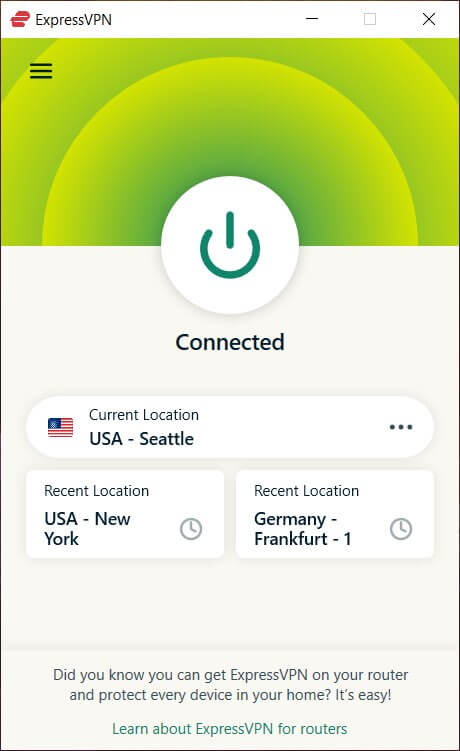
In addition to reliable desktop clients, ExpressVPN is also one of the best VPNs for Android we've tested, with very secure and stable apps.
As we already covered above, speeds were consistently fast with all ExpressVPN servers. Now let's examine PIA in terms of reliability.
PIA is pretty reliable. In the latest PIA review, we found the applications to work well without any bugs, crashes, or other problems. Below, I'm adjusting preferences within the PIA Windows client, including the VPN kill switch feature.
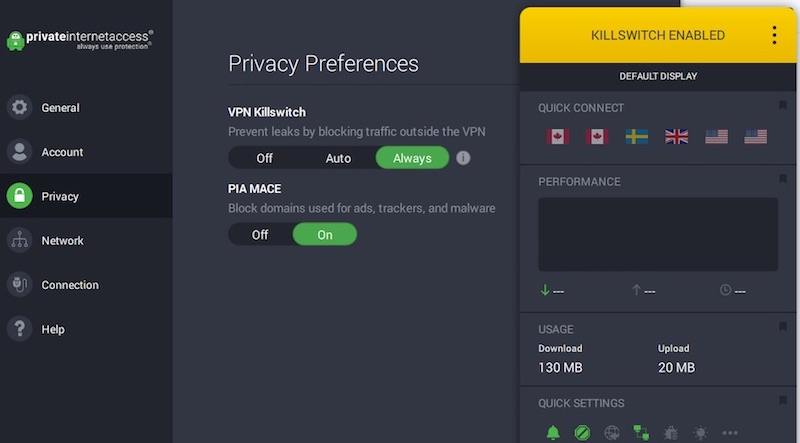
While speeds weren't as fast as ExpressVPN, Private Internet Access was still reliable in my tests. Therefore, in the reliability category, it's a tie between ExpressVPN and PIA.
Winner for reliability: Tie
Prices and refunds compared
Now let's examine the prices and refund policies. These two items will be combined into one category since they go together.
Private Internet Access price and refund policy
PIA is certainly a low-cost VPN, with the cheapest rate coming in at $2.03 per month with the 3-year plan. You also get three months free with this plan if it is the first time you have signed up.
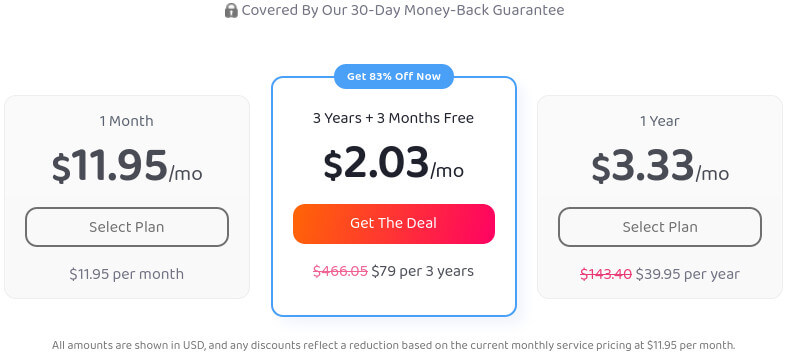
Private Internet Access pricing
One notable improvement to PIA VPN has been its transition to support for unlimited simultaneous device connections. This is a major improvement to the service. Most VPN providers allow for five or six simultaneous connections (ExpressVPN allows ten simultaneous connections). Given that as time goes by, we add more and more internet-connected devices to our homes and offices, this will be more of an advantage over time.
Given all this, PIA is not a bad choice in terms of price. But there are some other great cheap VPNs (that may offer more value) to consider if you are trying to save money. Now let's examine the refund policy.
PIA refund policy – Like ExpressVPN, PIA offers a 30-day refund window on all subscription plans. However, there is some fine print to be aware of. PIA will not process a refund through some payment processors, or if they have decided to terminate your account for some reason.
ExpressVPN price and refund policy
ExpressVPN is more expensive than PIA. And as we noted above, ExpressVPN supports ten simultaneous connections.
However, we have an ExpressVPN discount coupon for you that includes four months free and drops the price down to $3.49 per month. The coupon will be automatically activated through the link below the table:
| ExpressVPN plans | Basic | Advanced | Pro |
|---|---|---|---|
| 1-month | $12.99/month | $12.09/month | $19.99/month |
| 1-year | $4.99/month | $5.99/month | $8.99/month |
| 2-year | $3.49/month | $4.49/month | $7.49/month |
Deal: Get 73% OFF ExpressVPN 2-year plans >
ExpressVPN switched to a tiered subscription model to fit different security needs. The Basic plan includes core VPN features with support for 10 devices. The Advanced plan adds extras such as a password manager, enhanced protection tools, limited eSIM data for iPhone users, and 12 device connections. The Pro plan delivers the most benefits, offering more eSIM data, a free dedicated IP, identity and credit monitoring for US customers, data removal services, and support for up to 14 devices.
We've seen that ExpressVPN is more expensive than PIA, but even more important is the question of which VPN offers more value (gives you more for your money). Read on to see which one comes out on top in the value category.
ExpressVPN refund policy – ExpressVPN offers a 30-day money-back guarantee. The refund is a “no questions asked” policy and does not include any hidden exceptions or clauses. We see two other leading VPNs, Surfshark and NordVPN, also offering 30-day refund windows.
Winner: Private Internet Access (PIA is cheaper, supports unlimited simultaneous connections, and both PIA and ExpressVPN have the same refund window)
Features: Is ExpressVPN or PIA better?
Both ExpressVPN and Private Internet Access offer some decent features, but there is a winner in this category.
PIA features
- PIA MACE, which is a decent ad blocker
- Very large global server network with a presence in more than 91 countries
- Colocated, RAM-disk servers for maximum security
- 10 Gbps connections in the VPN server network for enhanced speed
- Smart DNS that lets you connect to VPN servers on devices that do not support VPN apps natively.
- Kill switch (IP leak and DNS leak protection)
- Split tunneling
PIA claims to work with different streaming services, but I've found that Private Internet Access VPN gets blocked more often than not, as I'll show you below. So overall, PIA is a pretty basic VPN service.
ExpressVPN features
The main features of ExpressVPN are:
- Threat Manager works to prevent hostile forces from tracking you. It can block ads, trackers, and malware sites. When activated, Threat Manager will protect any traffic flowing through the ExpressVPN servers.
- Built-in Network Lock (kill switch) feature that will block all traffic if the VPN connection drops (IPv4, IPv6, and DNS leak protection)
- Obfuscation features to hide VPN traffic as regular HTTPS encryption (useful if you need a good VPN for China, or anywhere else the VPNs are blocked)
- MediaStreamer service that allows you to use the VPN on Smart TVs and other devices that normally don't work with VPNs
- Split tunneling VPN feature that allows you to route certain websites or applications outside of the VPN tunnel
- Full streaming support, including Netflix, Hulu, Disney+, and more (tested below)
- RAM-disk servers for improved security
- Deploying colocated servers for even more security
- Large global server network with a presence in more than 94 countries
- 10 Gbps connections in the server network for improved speed
- Browser extensions for Chrome, Firefox, and Chromium-based browsers
We tested the ExpressVPN browser extensions in our VPN for Chrome roundup, and we were impressed by the features. This browser extension allows you to control the desktop VPN app, but also offers the following added features:
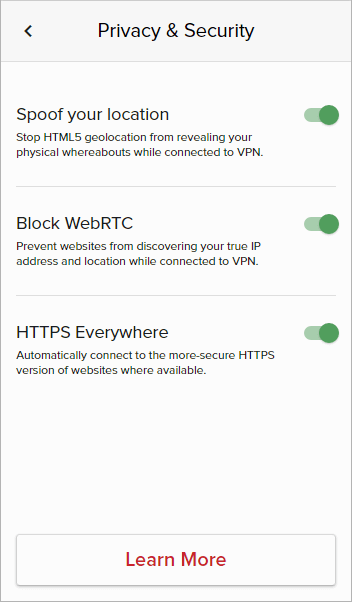
PIA has browser extensions, but they do not come with any extra features like those we see with ExpressVPN. While both providers offer good value, ExpressVPN comes out on top in the features category.
Winner with features: ExpressVPN
Does PIA or ExpressVPN have better support?
The support category is a big factor to consider. For those who may want help setting up and configuring their VPN, this can be a deciding factor. If things go wrong, and you want immediate assistance, live chat can be critical.
ExpressVPN provides 24/7 live chat support directly available through the website (no login required). I've tested the support on various occasions and found it to be professional and prompt (no long wait times).
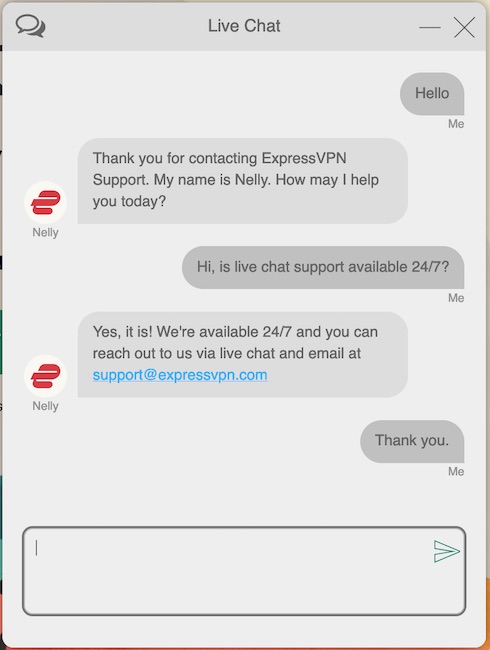
Aside from live chat, there are also numerous support videos and articles available on the ExpressVPN website. In short, support is solid with ExpressVPN. Now let's examine PIA support.
PIA support – Private Internet Access offers both ticket-based email support and live chat. I tested the live chat, which starts with an AI chatbot. When it couldn’t fully answer my question about obfuscated servers, it handed me off to a human agent. The support technician responded promptly, was polite and knowledgeable, and explained the feature clearly while addressing all my follow-up questions. Overall, the experience was smooth and professional.
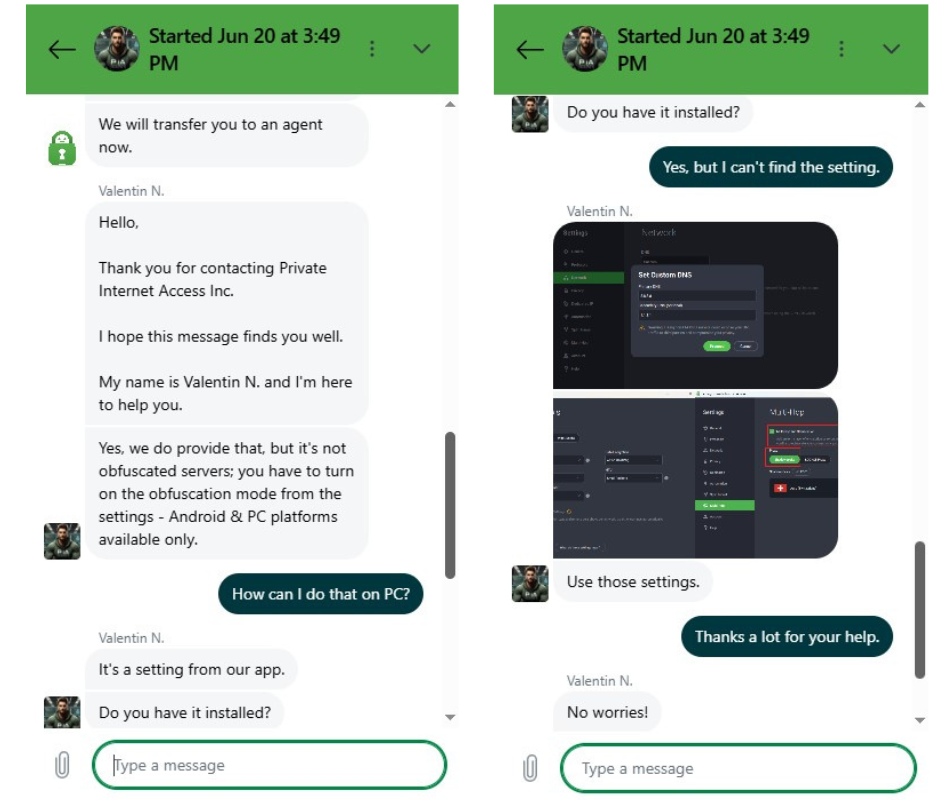
PIA also offers 24/7 live chat support
We call this category a tie.
Support winner: Tie
Netflix and Streaming: Private Internet Access vs ExpressVPN
Many people are turning to VPN services to unblock streaming websites. This includes using a VPN to unblock Amazon Prime, Netflix, Hulu, and many more. As a global traveler who watches Netflix, this is an area where I'm regularly testing VPNs.
First up is PIA. In my tests, I found that Private Internet Access works well with Netflix. Here you can see Netflix streaming the show ZeroDay while connected to a PIA server in the US.
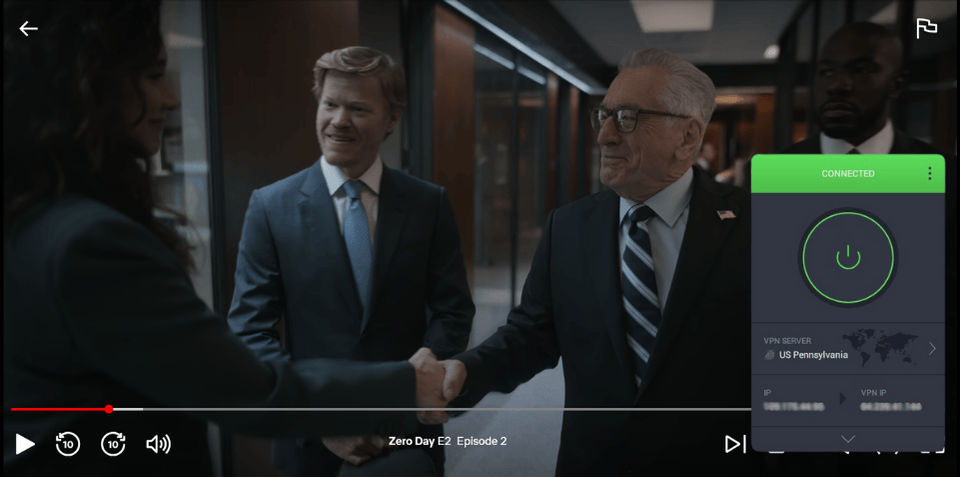
PIA also successfully overcame HBO Max’s blocks when using streaming-optimized servers, delivering smooth 4K playback. While it can likely unlock other services as well, results can be unpredictable, so it’s worth experimenting to see what works.
Next up is ExpressVPN. ExpressVPN unblocked Netflix for me without any issues. The streaming quality was perfect and it remains one of the best VPNs for Netflix. Below, I'm testing US Netflix with an ExpressVPN server in Washington, DC.
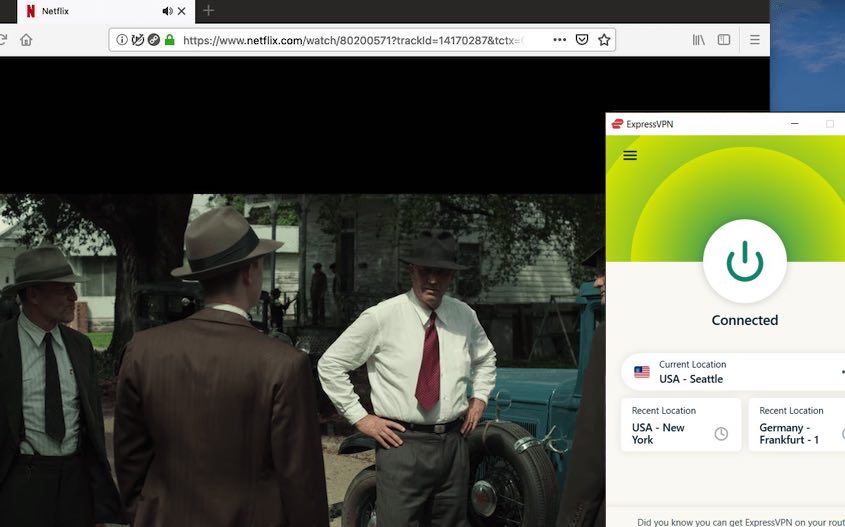
ExpressVPN officially supports the following Netflix regions: US, UK, Australia, Canada, France, Italy, Japan, and Germany. Additionally, ExpressVPN also works with Hulu, Amazon Prime Video, Disney+, and more. It is an excellent choice if you plan on using a VPN for streaming.
Streaming winner: ExpressVPN
Security and Encryption comparison
Security is arguably the #1 consideration when choosing the best VPN service for most people. First, we will look at ExpressVPN.
ExpressVPN security and encryption
Encryption and kill switch – ExpressVPN utilizes very strong encryption standards: an AES 256-bit cipher with a 4096-bit RSA key and SHA-512 HMAC authentication. They support the OpenVPN, IKEv2, and Lightway protocols, with Lightway being a self-developed protocol similar to WireGuard.
ExpressVPN apps also utilize the “Network Lock” kill switch feature to ensure all traffic remains encrypted in the VPN tunnel. DNS requests are securely translated by ExpressVPN's DNS servers (your ISP and other third parties cannot see your DNS queries).
Server security – ExpressVPN is one of the few VPNs in the industry that runs all their servers in RAM-disk mode. This ensures no data can ever be stored on a server, since hard drives are not in use, and also protects user data in the event of physical server seizures.
ExpressVPN calls this the TrustedServer feature. This offers a higher level of security over most other VPN services since the majority of services still use hard drives. In addition, ExpressVPN is moving to colocated servers.
Typically, a VPN service rents the vast majority of the VPN servers it uses. To provide coverage in different locations, they rent servers from another company that has a data center in the right location. This allows the VPN to quickly expand their server network but comes with potential drawbacks.
The servers they rent from a data center are controlled and maintained by that data center. This adds a small amount of risk since outsiders will have access to the VPN servers. Moving to colocated servers is meant to eliminate this risk.
When a VPN moves to colocated servers, it means that the VPN will own and operate the servers they use, rather than the data center operator. It eliminates the risk inherent in having outsiders working on your servers. ExpressVPN is in the process of moving to 100% colocated servers.
Security audits – ExpressVPN has also undergone numerous third-party audits. A partial list of these audits includes:
- A security audit was conducted by Cure53.
- A no-logs policy audit was conducted by PWC.
- Mobile app security audits by Cure53.
- Audits of all their desktop apps by Cure53 and F-Secure.
- Several audits of their no-logs policy conducted by KPMG.
We don't know of another VPN that has undergone a range of audits like this.
Now we will examine the security of Private Internet Access.
PIA security and encryption
PIA provides strong encryption standards but also allows the user to modify data encryption, authentication, and handshake. They support the OpenVPN and WireGuard VPN protocols. Below, you can see the encryption preferences in the PIA client.
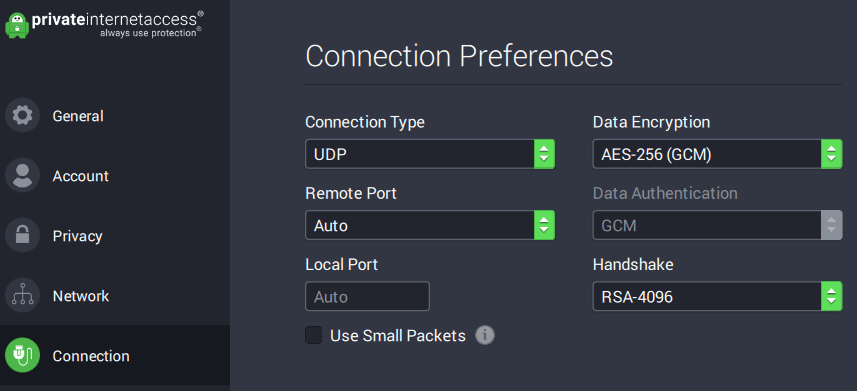
While PIA may be a decent VPN for Windows with these custom encryption options, it also comes with some drawbacks. On a positive note, it's great to see that WireGuard is supported with the VPN, but speeds are still far off the mark.
Server security – Like ExpressVPN, PIA has upgraded their VPN servers to run in RAM-disk mode.
Audits – In August of 2022, PIA reported that they had successfully completed an audit of their no-logs policy and server configurations. The audit was conducted by Deloitte.
This means that both of these VPNs are audited and verified no-logs VPN services — but ExpressVPN has many more audits under its belt.
Security winner: ExpressVPN
Conclusion: ExpressVPN wins in 2025
The clear winner in this updated ExpressVPN vs PIA comparison is once again ExpressVPN.
Despite being more expensive, it offers a better value. In comparison to PIA, ExpressVPN has much better performance, more features, stronger security, better support, full streaming access, and has passed multiple third-party audits. PIA has gained ground in one area by moving to support unlimited simultaneous connections, but this isn't enough to change our overall results.
Here's a recap for each category in this Private Internet Access vs ExpressVPN comparison:
- Company and jurisdiction – ExpressVPN
- Speed – ExpressVPN
- Reliability – Tie
- Prices and Refunds – PIA
- Features – ExpressVPN
- Support – Tie
- Netflix and Streaming – ExpressVPN
- Security and Encryption – ExpressVPN
In years past, I did occasionally recommend PIA as a basic, cheap VPN. However, Private Internet Access is clearly falling behind based on these test results, even in comparison to other cheap VPNs. And in a world of constant security threats and risks, you want to be using a VPN that is up to snuff in all areas.
Meanwhile, ExpressVPN continues to get better. It has made some big infrastructure upgrades for faster speeds while also launching the Lightway protocol. While ExpressVPN is one of the more expensive VPN services, it delivers great performance and reliability, along with the highest levels of security.
I strongly recommend going with ExpressVPN rather than PIA. And they do have a discount coupon for those interested in test-driving the VPN:
ExpressVPN Coupon:
Sign up for the 2-year plan and get 4 months added to your subscription for free.
(Coupon is applied automatically.)
Are you still on the fence? Want to consider other options? If that is the case, be sure to check out this guide containing our latest test results for the best VPN services.
Lastly, if you have used either ExpressVPN or PIA, feel free to drop a comment below to share your experience and help others decide.

You said that PIA does not have split tunneling, however they do have it and have had it for years, I know this because I use it. Unless the postred date of this article is a mismatch of when it was written. Also Express has an 8 connection limit. I have not checked the rest of the article but I would suggest that you do since it is your work.
Thanks we have updated the article with that information.